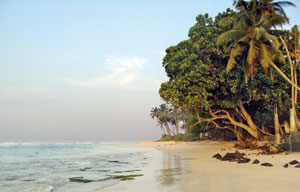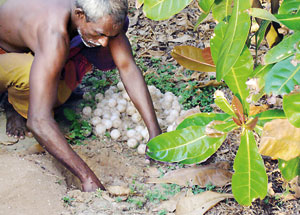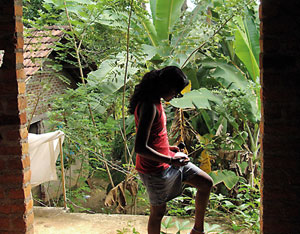I grabbed a board from the rack of worn but rideable rentals and walked to spend our first evening in Sri Lanka in the water, in the lineup of a reliable break known as “Plantation”. The beach is the backyard of a large McMansion owned by Danes and has only one entry into the surf, a narrow channel where the jagged rocky fringe along the shoreline is less wide. If you look like you’re about to paddle out from anywhere else, you’ll get a heads-up shout from a few local onlookers or a photographer — everyone else has been here before.
The view from Plantation is wild — even though it has been discovered and christened by Westerners, the view of the coast from the water (if you put your thumb over Elsinore) is a picture postcard of an untouched tropical island. Very different from my last year’s outings in the sea just off 91st Avenue in Queens.
But in the other direction, where there’s usually just ripples and pelicans (here the occasional sea turtle), Plantation looked out on all the surfers in Midigama. So I looked in the other direction. That’s probably why I was a bit inattentive, distracted enough to ride a wave too far in to where the rocks began, and to put my feet down as defence against the current pushing in — from the shore, the beach looks sandier than others, so I’d left my booties on land. Sometimes in life, silly mistakes go unpunished. Other times, sea creatures do things to you that really, really hurt.
I looked at my foot — a number of thin, black sea urchin spikes had perforated my big toe and broken off too deep to pull out. In Sinhalese, these creatures are called ikiriyya, a name with likely roots in the old Indo-European word for “Ow ow ow, Hare Krishna that hurts.”
I showed a few other surfers. “That’s not good.”
Most of them had gone through urchin treatment before, but they didn’t take it lightly. Left in too long, the urchin’s poison could make a nasty mess of your insides, making parts of your body that are supposed to do one thing do something very else.
One option was the hospital — probably five hours and a trip-razing journey to Colombo away. But we’d come too far for that. The general advice endorsed by this western medical council: take a few swigs of local brown coconut arrack, sterilize a sewing needle with a lighter, and dig. And good luck finding a needle in town, the only other option is a penknife.
So I shuffled on to shore and smiled to a few locals sitting on the stone wall outside the Danish villa.
“Are you damaged?”
A dark, beautiful girl in jean shorts looked up through wavy burnet hair. I hadn’t said a word — she just knew.
Soon 17- year-old Jannu was surrounded by her family — her brother and her cousin whose name meant “moon” — and and her uncle had appeared and gone away. And this man — I learned his name was Gijanta — returned quickly carrying long flowers with stiff green stems and pink violet buds. Without shirt and wrapped in a beautiful, faded sarong, Gijanta’s face had the perfect number of wrinkles and teeth for inspiring confidence; this was better than any hospital, more mollifying than any insurance.
He made a pink paste of the flower buds, twisting open the stem and mixing in the green drops that fell out. I forgot the names of the two flowers — huna or hura or hana — that his nephews repeated, but it wouldn’t’ve mattered. The next day when I tried to smush the flowers to make the paste Gijanta had made, nothing came out.
Gijanta left me, surrounded by his family, with a thick layer of rose-coloured cream on the underside of my toe, and returned a moment later with a lighter to broil it. For minutes he cooked the floral concoction, killing the toxins in the needles, communicating advice to the others to translate. For the medicine man and I, the only common language was eye contact, his exuding unfaltering tranquillity, mine drifting off...
Before I left (on the motorbike of the son whose name meant “moon”), Jannu had found another untreated needle and they repeated the whole process from the beginning.
In the morning I rinsed off the paste in a few dawn waves. Jannu waved from the same spot outside the Danish mansion. She called us to breakfast in their grandmother’s house, behind which sat theirs, large and brick and with no doors, open to all the monkeys in the forest.
That’s where the story would have ended in a different age, in a time before text messaging and lingering connectivity. I should have left with Jannu’s face and Gijanta’s face and that of the cousin whose name meant “moon” silkscreened onto my memory like hazy apocrypha, to idealize and mythologize for eternity. But in Sri Lanka, the norm is to ask for traveller’s phone numbers, addresses, emails — and in their country and their debt, not wanting to offend, we yield.
The innocence is not lost, the simplicity of the first interaction is not complicated, but frequent texts and phone calls from the +94 country code (and the sincere entreaty for investment in renovation of the house/hostel that would amount to tens of thousands of American dollars) stitch the would-be ideal to reality.
The night before, over lukewarm Sri Lankan beers that never got cold in Sri Lankan freezers, Jannu’s brother and the cousin whose name meant “moon” talked about their studies in busy cities with no beaches. Even though their presence on property meant for tourists was supposedly prohibited by law (“foreigners only”), the beachfront just down the steps from our shack was made for chilling. You can’t beat this, said the cousin whose name meant “moon” — he told me he was called Teri, for short.
Open ocean and the lights of fishing boats strung along the horizon.
“I like to feel the freedom,” said Teri.
—The writer has reported for Haaretz in Tel Aviv and is the founder of the online travelogue INGULFED.com. He works for New York University in Abu Dhabi.
|




